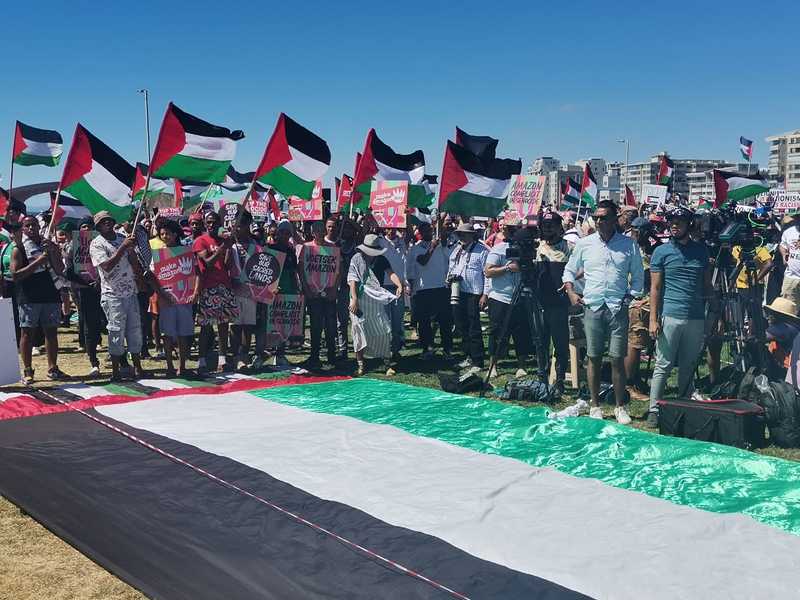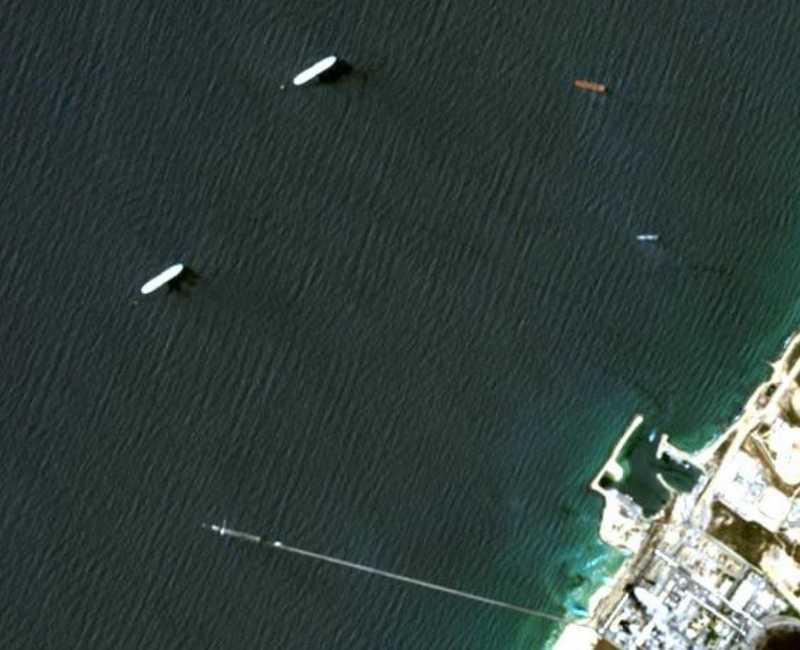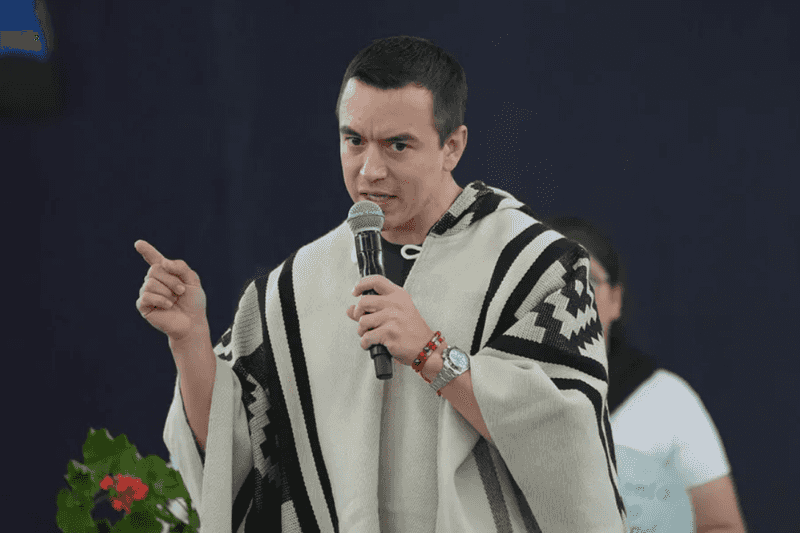
On 29 November, as the mania of Black Friday sales ensues, a growing global movement will take to the streets to challenge one of the most emblematic institutions of unchecked corporate power: Amazon. This year’s Global Day of Action Against Amazon, driven by the “Make Amazon Pay” campaign, is not just about pushing back against a single company—it is a stand against the dehumanising forces of modern capitalism, systemic inequality, and the exploitation of labour, land and livelihoods.
Spanning over 30 countries, this protest is a rallying cry against Amazon’s many wrongs: its enabling of genocide through Project Nimbus, its exploitative labour practices, its systematic tax evasion, its destruction of our environment, and its desecration of sacred Indigenous lands in South Africa.
Project Nimbus: From Digital Apartheid to Genocide
At the heart of Amazon’s dystopian entanglements lies Project Nimbus, a $1.2 billion contract with the Israeli state that epitomises the marriage of Big Tech and state-sponsored genocide. Alongside Google, Amazon provides the infrastructure, AI, and data capabilities enabling Israel’s militarised surveillance of Palestinians. Through tools like facial recognition, predictive policing, and real-time tracking, Project Nimbus has become the backbone of a digital regime that targets, disenfranchises, and destroys. This destruction does not discriminate, targeting non-combatants, women and children, journalists, aid workers, and even United Nations personnel.
What began as analogue apartheid has metastasized into digital genocide. By mechanising oppression, Amazon has not only lent its hand to an illegal occupation but has reinforced systems of control that shreds Palestinian life. Yet this isn’t just a regional issue. It is a blueprint for the corporatised surveillance and suppression of marginalised peoples globally.
The protests from Amazon’s own employees and activists through the “No Tech for Apartheid” campaign shine a light on the complicity of corporate titans like Jeff Bezos, whose wealth—now reaching over $220 billion—is built on the suffering of those on the receiving end of these systems of violence.
Labour Exploitation: The New Frontier of Corporate Colonialism
Amazon’s labour practices are a testament to the brutal efficiency of contemporary exploitation. From its warehouses in the United States to its global operations, the stories are disturbingly familiar: workers pushed to their physical and mental limits under impossible quotas, unionisation efforts crushed underfoot, and injuries treated as collateral damage in the pursuit of profit. One of the lowest moments for Amazon workers occurred in Illinois December of 2021 when six warehouse workers were killed as the company forced them to stay at work during a tornado.
In South Africa, a country that fought a bitter and historic battle against labour exploitation and systemic inequality, Amazon’s anti-union stance poses a clear threat. The company’s treatment of workers exposes its broader agenda: to strip labour movements of their power and solidify a global economy where corporate interests eclipse human dignity.
Amazon's operations mirror the very systems of colonial domination that subjugated nations like South Africa. In the short term, and in the narrowest sense, it creates jobs, but jobs that exploit rather than empower. It builds economies, but economies that enrich shareholders—typically in the Global North—while impoverishing the workers who sustain them.
Amazon’s mastery of tax dodging is the crowning jewel of its corporate greed. By exploiting loopholes and tax havens, Amazon hoards billions while contributing little to the societies that sustain it. Its tiny effective tax rate underscores the systemic failures that allow corporations to rob public coffers while demanding infrastructure be built with public money.
For South Africa, where inequality runs deep, Amazon’s tax dodging has dire consequences. Every South African rand dodged by corporate behemoths like Amazon is a rand stolen from the schools, hospitals, and public services that millions rely on. This is theft, plain and simple, dressed up in the language of "smart business."
Cape Town’s Sacred Lands: Corporate Hubris Meets Indigenous Resistance
Amazon’s contempt for humanity extends to Cape Town, where it is putting the finishing touches of its African headquarters on sacred land. The confluence of the Liesbeek and Black Rivers is a site of cultural and spiritual significance for the Indigenous Khoi and San people, a living symbol of resistance against colonial erasure, a stone’s throw away from where the Battle of Saltriver took place, where, in 1510, the Khoi defeated Portugal’s Francisco de Almeida, the most formidable Viceroy of what was the largest colonial empire on earth. Moreover, it is the site of the first land theft in Southern Africa by the Dutch East India Company, the “Amazon” of its time, being the largest corporation on earth, with its own private army, which not only brutalised and ethnically cleansed Indigenous people, but imported slaves from its colonies around the world.
Amazon’s decision to bulldoze this land for its corporate ambitions is a direct assault, not only on the rights of Khoi and San people, but all Africans. It reduces centuries of heritage to rubble in the name of economic development, setting a dangerous precedent for the treatment of sacred sites worldwide.
It has found useful friends and allies in the City of Cape Town and provincial government of the Western Cape, run by the neoliberal Democratic Alliance.
This fight is about more than a building—it is about the survival of culture, the preservation of history, and the assertion that no amount of corporate capital can buy the soul of a people.
Jeff Bezos: The Face of Corporate Tyranny
At the helm of this empire is Jeff Bezos, a man whose wealth stands as a grotesque monument to global inequality. His ownership of The Washington Post gives him a direct pipeline to shape public discourse, while his fawning praise of figures like Donald Trump reveals the hollow opportunism of Amazon’s leadership.
When Trump won the election Bezos tweeted: “Big congratulations to our 45th and now 47th President on an extraordinary political comeback and decisive victory. No nation has bigger opportunities. Wishing @realDonaldTrump all success in leading and uniting the America we all love." His net wealth surged by $7bn the day after the election bringing his documented wealth to around $230bn.
The tech elites, like Bezos, are the overlords of a global system that trades in exploitation, oppression, and environmental destruction. They stand as symbols of a world where a handful of billionaires wield more power than entire nations, steering humanity toward dystopia while hoarding wealth that could eradicate poverty many times over.
Amazon’s crimes are not anomalies—they are the inevitable result of a capitalist system that places profit above people, power above justice, and corporations above accountability. The Global Day of Action Against Amazon is not just a protest against a single company; it is a stand against a world where the few thrive at the expense of the many.
From the streets of Cape Town to the avenues of São Paulo, from union halls in the United States to protest camps for Palestine, this movement is a testament to the power of collective action. It is a reminder that the fight against Amazon is part of a broader struggle for a just and equitable world.
Julia Eccles is the national coordinator of Save Our Sacred Lands, a grassroots campaign protecting sacred Indigenous land in South Africa.





